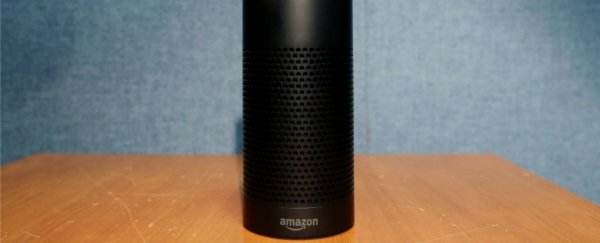Authorities in Arkansas are investigating the death of a man whose body was recently found in a hot tub, and they think the suspect's Amazon Echo speaker – and the voice-activated software that controls it – might have been a witness to what happened.
Echo is a hands-free speaker you control by talking to 'Alexa', which is pretty much Amazon's version of Siri, and police think the software might have overheard the murder. But so far Amazon is refusing to hand over the data as evidence.
The whole ordeal started last year on 22 November 2015 in Bentonville, Arkansas, when authorities found the body of Victor Collins floating dead in a hot tub inside his friend's house. The friend, James Andrew Bates, was later charged with murder, but is presumed innocent until proven otherwise.
Now, the prosecutors are trying to obtain the data from Bates' Amazon Echo smart speaker to see if there are any clues as to what happened that night. Specifically, they are trying to find any evidence to support their hypothesis that Bates strangled Collins and left him in the hot tub.
While police often collect computer or smartphone data from a crime scene, it's the first time authorities are trying to pull data from a smart speaker, and treating the software as a kind of virtual witness to the crime.
If you haven't used an Echo before, it's a sleek-looking smart speaker that allows a user to talk to 'Alexa' – a Siri-like AI voice that can answer questions, play music, or perform other assistant-like tasks.
To pull this off, the speaker is constantly listening to the room, waiting for the owner to say 'Alexa' followed by a command.
For example, a person could say: "Alexa, play Single Ladies by Beyoncé". A second later, the speaker will play the song.
Since the speaker was at the crime scene and listening to the people around it, authorities think that it might have overheard something pertinent to the case. But Amazon isn't willing to give up that data, saying that they "will not release customer information without a valid and binding legal demand," according to a statement issued by spokeswoman Kinley Pearsall.
Amazon also says that Echo only records data when it hears its 'wake word' – "Alexa" or "Amazon" – and stops recording once the task is completed. This means that if you asked Alexa to play Beyoncé, it wouldn't record you singing along afterwards.
Despite this, authorities still want the data to make sure nothing was overheard, claiming that collecting evidence of this nature is just part of the investigation and should be turned over immediately as a part of the search warrant.
"It is a search warrant for a new device, but the legal concept is old as Methuselah," Benton County Prosecuting Attorney Nathan Smith told the Associated Press, comparing the Echo data collection to other technological evidence gathering like pining a suspect's cell phone to track locations.
"They'll say it's for privacy reasons, but I don't believe they have a legal leg to stand on," Smith told Eliott C. McLaughlin and Keith Allen at CNN, referring to Amazon.
While it's interesting to think that Alexa might be able to in a sense testify against a user in the court of law, this case will actually set precedent about how other smart home technologies are used by law enforcement in the future.
The problem here, according to Nuala O'Connor, from the Centre for Democracy and Technology, a civil-liberties non-profit, is that gathering a bunch of tech data like this to make a case could lead to law enforcement agencies making incorrect assumptions about a person's behaviour.
"That's where we're going to get into issues of circumstantial evidence," O'Connor told the Associated Press.
Bates' defence attorney agrees, claiming that a gadget designed to make life easier shouldn't be then used against you. On the other hand, according to Joel Reidenberg, an expert from Fordham University's Centre for Law and Information Policy, cases like this are likely to pop up more and more in the future, so we need to work out how to deal with them now.
"We haven't yet seen, but we will see, the same kind of things happening with these voice-activated home devices," Reidenberg told CNN. "These are the perfect surveillance devices, if they aren't treated with care."
Right now there are two big players in the smart speaker field – Amazon Echo and Google Home – but as these devices become more popular, more cases like this are going to pop up, meaning the repercussions of this case could be felt far into the future.
Bates, who has expressed his innocence, will go on trial in March 2017.
